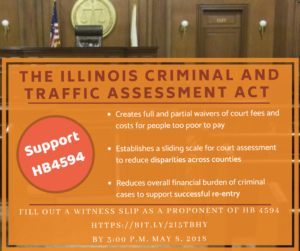Announcing Policy Positions on Criminal Court Fines, Fees, & Costs + Action Needed Today!
To skip right to action step and file a witness slip in support of The Criminal and Traffic Assessment Act (HB 4594), click here!
In one of the richest countries in the world, local and state governments impose the costs of financing the criminal court system on the backs of those who can least afford it: low-income people accused of crimes. People and families are trapped in a cycle of debt and poverty solely because of an inability to pay court costs, fines, and fees that are imposed as “user fees” for the criminal justice system.
Inability to pay these assessments leads to growing debt and a host of other consequences including: extended probation, suspension of driver’s licenses, conversion of misdemeanors into felonies, damaged credit scores, private debt collection actions, steep late fees of 30% or more, and even jail time for failure to pay. These penalties limit the ability of people to support themselves and to move on after their court obligations have ended. Furthermore, these crippling consequences appear to result in little financial benefit to the very insitutitions that are imposing them. The cost of imposing these assessments outweighs the perceived benefits of imposing court costs, fines, and fees on people who are unwillingly “using” the system.
Chicago Appleseed Fund for Justice and our partners have been doing research and advocacy to determine how Illinois can stop this harmful practice and mitigate the harm that has already been caused to people who have criminal justice debt. In 2016, we released our Statement on Excessive Court Fines, Fees, and Costs, detailing the problem and making a number of recommendations to improve the court system. The current court costs, fines, and fees system is so complicated and mult-pronged that it is difficult to even understand, much less to hold government actors responsible for the serious and unfair consequences imposed on vulnerable people and families. Our research has found that too often, low-income people are penalized for their poverty as the amounts they owe increase exorbitantly due to payment plans and high interest rates. Required attendance at court-ordered programs solely because debt is still owed also takes time away from work earning wages that could be used to pay off debt. These costs not only impact the individuals who owe that debt, but their families, and their communities. For low-income communities of color, this kind of wealth extraction further compounds the effects of disinvestment.
Chicago Appleseed Fund for Justice and our partners in the Working Group on Court Costs, Fines, and Fees have collected Illinois impact data over nearly two years, including surveys of court-involved people in Peoria, Champaign, and the Chicago area, and of attorneys in the Cook County Public Defender’s Office. In consideration of both this data and research and policies developed by experts nationwide, the Working Group has developed the following Policy Commitments aimed at mitigating the tremendous and varied impact of court costs, fines, and fees on affected communities. The four main commitments are:
-
Illinois must create a uniform and clear court costs, fines, and fees system that accounts for ability to pay and ensures that people with low and moderate incomes are not unduly and disproportionately burdened during assessment imposition.
-
Collection of monetary assessments should be fair, clear, uniform across counties but adjusted for income, and reliance on private collection agencies should be eliminated or at least carefully overseen by the state.
-
Illinois must not impose additional punishments simply because a person is unable to pay court costs, fines, or fees.
-
The state must remove the barriers to reentry that monetary assessments present to people and families with low and moderate incomes.
The full Policy Commitments and the impact data and research that support them can be found here.
Luckily for residents of Illinois, there are several pending pieces of legislation aimed at addressing these problems. Recently, the Criminal and Traffic Assessment Act (HB 4594), legislation that will simplify Illinois’ byzantine system of over 90 court costs, fines, and fees and allow for waiver based on ability to pay, passed out of the Illinois House of Representatives. Read more about the bill on this fact sheet developed by the Chicago Bar Foundation. HB 4594 will be in the Judiciary Committee in the Illinois Senate tomorrow, May 8th at 3:30pm. You can fill out a witness slip in support here. You can find instructions for how to submit a witness slip here.
For more than three years, the Chicago Appleseed Fund for Justice, has worked hard to bring attention to this unjust system that brutally punishes poverty—a system that Illinois courts have called “labyrinthine,” “uncollectible,” “oppressive,” and “futil[e].” Indeed, the current system devastates families, and counties often can’t even collect the money. Chicago Appleseed’s Policy Commitments illustrate why HB4594 provision for allowing waiver is critically important – Of 81 Cook County Public Defenders surveyed, 81.5% said that judges never or rarely ask about a defendant’s ability to pay and only only 17% of about 300 court-involved people surveyed said the judge asked them about their ability to pay.
Chicago Appleseed Fund for Justice and our partners will continue to use these Policy Commitments and dialogue with impacted individuals and community to identify other ways to counter the crippling impact of court costs, fines, and fees in Illinois. To learn more and join in our effort to stop this harmful practice and develop more equitable, just, and sustainable ways to fund our court systems in Illinois, please contact Sharlyn Grace (sharlyngrace@chicagoappleseed.org) to get involved.

